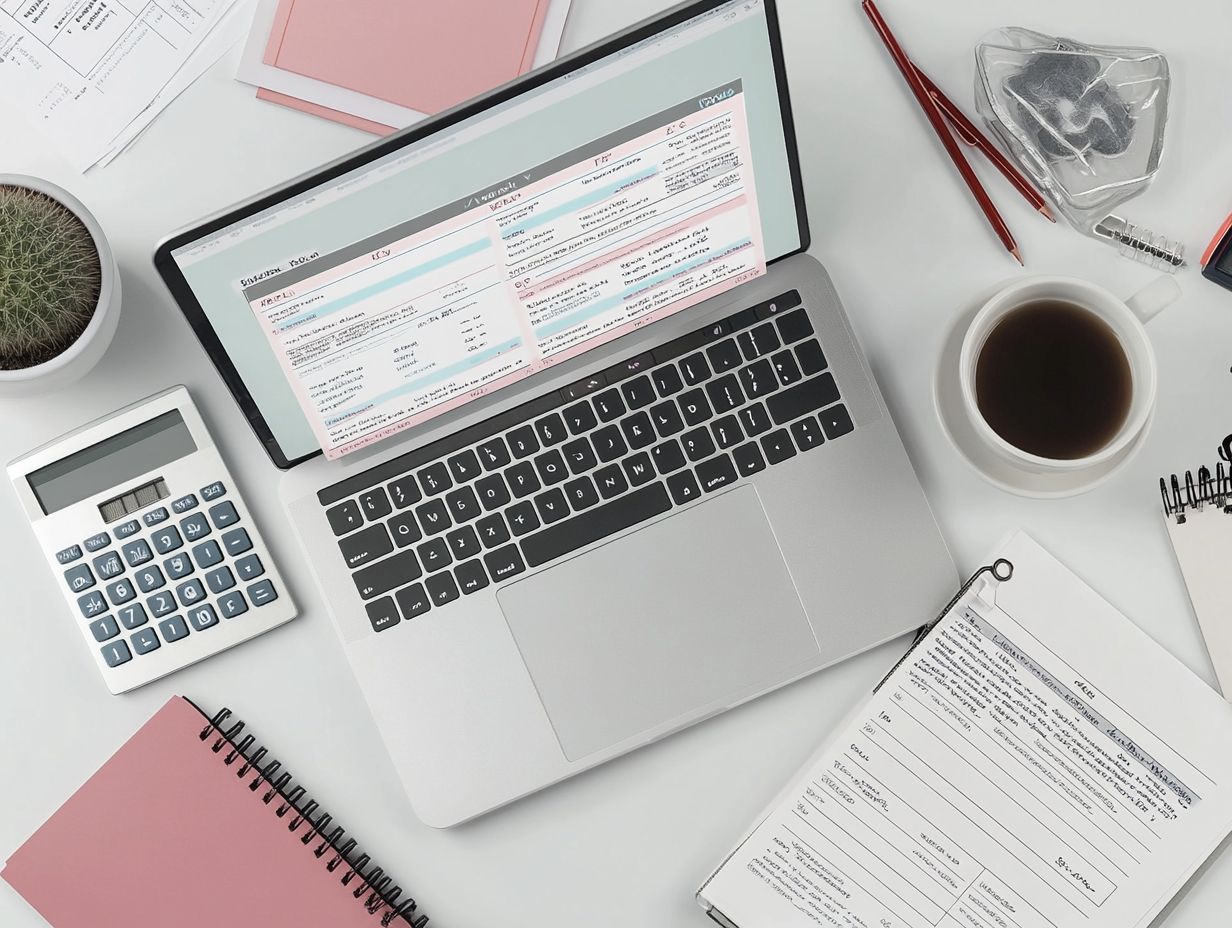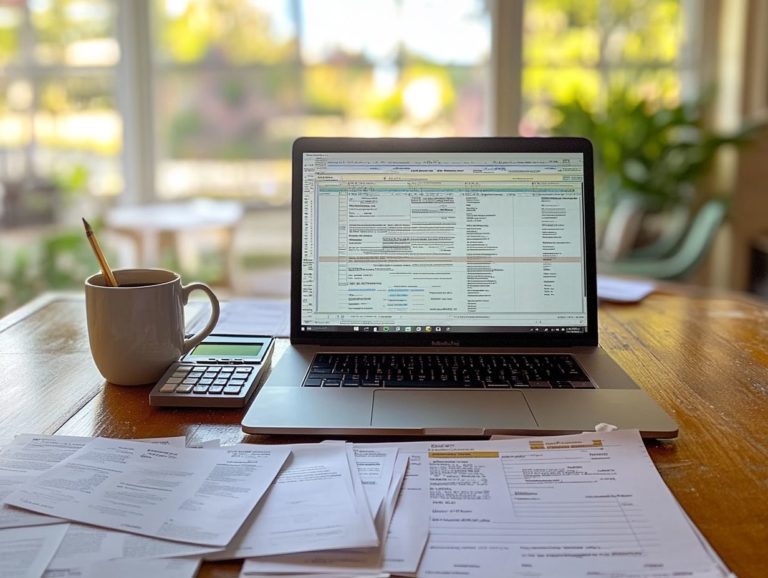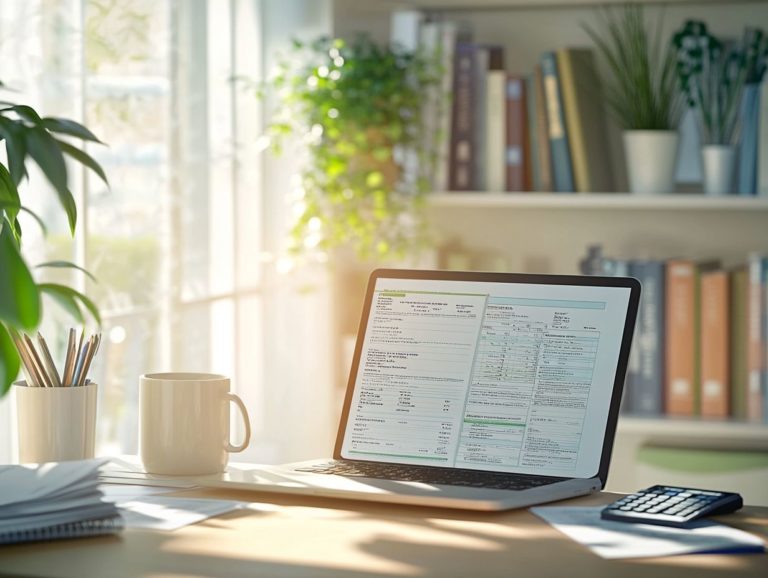Tax Resources for Freelancers: Where to Find Help
Navigating the intricate landscape of taxes can feel overwhelming, especially for freelancers juggling various income streams.
This article distills essential tax concepts specifically for independent workers. You ll uncover which taxes apply to you and learn how to prepare efficiently by organizing your finances.
You’ll also weigh the pros and cons of doing it yourself versus hiring a professional. Valuable deductions you may be overlooking will be highlighted, along with resources to simplify the process.
Your journey to financial peace begins here!
Contents
- Key Takeaways:
- Understanding Taxes for Freelancers
- Tax Preparation for Freelancers
- Tax Filing Options for Freelancers
- Tax Deductions for Freelancers
- Resources for Freelancers
- Frequently Asked Questions
- What are some common tax resources for freelancers?
- How can I find a tax professional who specializes in working with freelancers?
- Are there any free tax resources available for freelancers?
- Where can I find information about tax deductions for freelancers?
- Is it necessary for me to hire a tax professional as a freelancer?
- What should I do if I have a question about my taxes as a freelancer?
Key Takeaways:

Understanding Taxes for Freelancers
Understanding taxes as a freelancer is essential for maintaining your financial stability. Compliance with tax laws is crucial.
As an independent worker, you face unique tax obligations that differ from traditional employees. This includes familiarizing yourself with self-employment taxes and accurately reporting your freelance income.
You’ll also need to navigate various forms required by the Internal Revenue Service (IRS), including tax returns and estimated tax filings. It’s vital to understand the deductions available for your freelance business and related expenses.
What Taxes Apply to Freelancers?
As a freelancer, you’re subject to various taxes, including the self-employment tax that covers Social Security and Medicare. Unlike traditional employees, you need to estimate and pay these taxes quarterly to the IRS.
Grasping your income tax obligations and your self-employment tax is essential for accurate reporting. You might also encounter state-specific taxes, which add complexity to your financial management.
To navigate this effectively, consider using tools to calculate your total tax liability. Keeping precise records of your income and expenses will help.
Resources like tax preparation software or consulting with a tax professional can enhance your compliance efforts. Maximize your deductions and make the tax filing process feel more manageable!
Tax Preparation for Freelancers
Tax preparation for freelancers demands organization and precision. Keeping track of income and expenses is crucial for accurate tax reporting and compliance.
Maintain meticulous records of your freelance income, business expenses, and applicable deductions. Understanding how to categorize expenses and identify what qualifies as deductible is vital.
Enlisting the help of a tax professional can be invaluable. They can guide you through the complexities of tax preparation and help you maximize your financial benefits while minimizing stress.
Organizing and Tracking Income and Expenses

Effective organization and tracking of income and expenses are crucial for freelancers. This allows for a clear overview of your business and helps optimize important tax deductions.
Using accounting software or spreadsheets makes it easy to categorize income streams and track business-related expenses. Tools like QuickBooks, FreshBooks, or Wave can automate tedious bookkeeping tasks, ensuring accuracy and boosting efficiency.
These platforms often feature reporting functions that provide real-time insights into financial performance and the ability to generate invoices for streamlined client billing.
Additionally, maintaining digital copies of receipts and conducting monthly reviews can significantly enhance your financial organization. This reduces stress during tax season and helps you protect against unexpected financial discrepancies, ultimately fostering sustainable growth for your business.
Tax Filing Options for Freelancers
Freelancers have various tax filing options, whether you choose the DIY route or consult a tax professional. Each method has its benefits and drawbacks.
Many freelancers prefer online platforms or tax software for a streamlined process. These tools guide you through essential forms, such as the 1099-NEC (a form used to report non-employee compensation) or 1099-K.
Engaging a tax professional offers invaluable insights into deductions and credits tailored to your unique situation, potentially leading to significant savings in the long run.
DIY vs Hiring a Professional
When it comes to tax filing, you need to decide between tackling it yourself (DIY) or hiring a tax professional. Each option has its advantages.
DIY can be cost-effective and straightforward, especially with user-friendly tax software available. However, consulting a tax professional provides personalized insights that can optimize your tax returns for maximum deductions.
If your tax situation is simple like having standard income and few deductions then the DIY method may be sufficient and budget-friendly.
Conversely, if you manage multiple income streams or numerous deductions, the expertise of a professional can be invaluable. An expert can navigate the complexities of tax codes and ensure compliance.
Consider the time commitment: while DIY may seem appealing, the hours spent researching tax implications might outweigh the cost of professional help. Investing in expert assistance could save you precious time, allowing you to focus on growing your business.
Tax Deductions for Freelancers
Tax deductions are essential for managing your finances as a freelancer. They provide a valuable opportunity to reduce your taxable income and lower overall tax liabilities.
You can benefit from various deductions, including business expenses, costs related to maintaining a home office, and the possibility of qualifying for tax credits such as the Earned Income Tax Credit or the Child and Dependent Care Credit.
Embracing these deductions leads to a more favorable financial landscape for your freelance endeavors. Take charge of your finances today!
Common Deductions and How to Claim Them

Freelancers can use several common deductions to lower their tax bills. These include expenses related to your home office and other business costs.
Don’t forget about deductions for travel expenses during business trips. This includes transportation, lodging, and meals.
You can also deduct necessary software subscriptions for project management or design work. Costs for purchasing or leasing essential equipment like computers and cameras are also deductible.
When you file your taxes, you’ll list these deductions on Schedule C, where you summarize your income and expenses. Keeping receipts and invoices organized helps prove your claims and reduces audit risks.
Resources for Freelancers
As a freelancer, you have a wealth of resources available. Government websites provide essential tax information, and professional organizations offer valuable support.
Using online tools to track your expenses and income can significantly improve your financial management.
Government Websites and Online Tools
Government websites and online tools are key resources for freelancers seeking accurate tax information. For example, the IRS website is rich with tax forms, instructions, and guidelines for freelancers.
State-specific tax authorities, like the California Franchise Tax Board, provide localized resources to help with state tax obligations, such as estimated taxes and quarterly payments.
Online tools like QuickBooks and FreshBooks simplify compliance with IRS regulations. These platforms streamline your accounting and assist with tax preparation.
These tools integrate easily with your bank accounts, making income and expense tracking straightforward. By using these resources and online applications, you ll ensure compliance and make financial management a breeze.
Professional Organizations and Services
Professional organizations and services provide you with essential support, networking opportunities, and resources that can significantly enhance both your career through continuing education and networking with other freelancers and knowledge about self-employment taxes and how they work. These organizations, specifically designed for freelancers, frequently offer workshops that cover important aspects like reporting for Schedule C, webinars that help you learn about tax implications of 1099-NEC, 1099-K, and 1099-MISC forms, and expert guidance on handling Social Security and Medicare contributions to navigate tax obligations and optimize deductions.
They also create valuable connections, linking you with mentors who can guide you through the complexities of April 15 deadlines, $400 thresholds, and peers that foster a genuine sense of community in what can often feel like a solitary profession. Many of these groups include resources tailored to your unique needs, such as health insurance, retirement plans, and even legal assistance that includes advice on structuring your business as an LLC.
Join these organizations to unlock exclusive discounts on software options that can effectively track your payments due and deductions like the Earned Income Tax Credit and Child and Dependent Care Credit, as well as tools that can streamline your operations, effectively maximizing your efficiency. Additionally, consider exploring Maximizing Deductions: A Freelancer’s Guide to further enhance your financial strategies. Ultimately, these organizations act as invaluable partners, enabling you not only to refine your skills but also to thrive amidst the complexities of running your own business.
Frequently Asked Questions

What are some common tax resources for freelancers?
Some common tax resources for freelancers include the Internal Revenue Service (IRS) website, tax preparation software like TurboTax or H&R Block, and online freelancing communities such as Freelancers Union or Upwork.
How can I find a tax professional who specializes in working with freelancers?
You can search for tax professionals who specialize in working with freelancers through directories such as the National Association of Enrolled Agents or the National Association of Tax Professionals. You can also ask for recommendations from other freelancers in your network.
Are there any free tax resources available for freelancers?
Yes, the IRS website offers a variety of free resources for freelancers, including forms, publications, and online tools. You can also check with your local government or small business development center for free tax assistance for freelancers.
Where can I find information about tax deductions for freelancers?
The IRS website has a section specifically for self-employed individuals, which includes information on tax deductions for freelancers. You can also consult with a tax professional for advice on which deductions you may be eligible for.
Is it necessary for me to hire a tax professional as a freelancer?
While it is not required, hiring a tax professional can help ensure that you are filing your taxes correctly and taking advantage of all possible deductions. It can also save you time and stress during tax season.
What should I do if I have a question about my taxes as a freelancer?
If you have a specific question about your taxes as a freelancer, you can reach out to the IRS directly or consult with a tax professional. You can also search for answers in online forums or communities specifically for freelancers.






